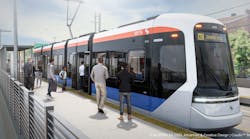SEPTA’s proposed FY24 Capital Budget of $976.8 million slightly under FY23
The Southeastern Pennsylvania Transportation Authority (SEPTA) released its proposed Fiscal Year (FY) 2024 Capital Budget of $976.8 million, which is slightly less than FY23’s approved capital budget of $1.1 billion. However, the authority’s proposed 12-Year Program of $12.6 billion represents the largest ever investment in the system. The proposed capital plan follows the release of the authority's proposed FY24 Operating Budget last week.
SEPTA describes the proposed FY24 Capital Budget and 12-Year Program as taking steps toward transforming SEPTA into a lifestyle network rather than commuter focused. The capital plan is guided by SEPTA Forward, the authority’s strategic plan. However, with an aging network, including trolleys that are 40 years old and a regional rail fleet that is 50 years old, SEPTA is prioritizing essential infrastructure work and safety and security improvements to ensure its aging system remains reliable.
One area of concentration is in accessibility. Currently, 61 percent of SEPTA Metro trips are through an accessible station. The authority says its investments in the Trolley Modernization program and accessibility projects on the Broad Street Line and Market-Frankford Line will see that number increase to 99 percent of trip by 2035.
The FY24 capital plan includes $369.5 million in state funding, which is supported by newly bondable state funding under Act 89, $363 million in federal funding, which is boosted $100 million annually through the Infrastructure Investment and Jobs Act, $230 million in revenue bonds and $14.3 million in local funding.
“Investing in transit is an investment in our climate, equitable access to opportunities, public health and safety and economic strength,” said SEPTA General Manager and CEO Leslie S. Richards. “We are grateful to our elected officials for recognizing this and delivering the capital funding we need to create a transit system that works for everyone.”
Despite the change in state funding and the significant increase in available federal funds, Richards explains SEPTA lags peer agencies in capital investment and faces a $5.1 billion State of Good Repair backlog, which the authority says is due to the impacts of inflation and the cost of materials and construction.
“Despite higher-than-ever funding levels, we are still not keeping up with our peers or even our own backlog of needs,” Richards said. “SEPTA still requires additional state and local resources to maximize billions of dollars in federal competitive funds that are available under the IIJA. We are determined not to leave any money on the table.”
SEPTA will hold two public meetings on the proposed FY24 Capital Budget with the SEPTA Board of Directors scheduled to consider the proposed budget in June. If approved, the budget would go into effect on July 1.
What's included in SEPTA's proposed FY24 Capital Budget and 12-Year Program
The proposed FY24 Capital Budget and 12-Year Program includes:
- $213 million for projects of significance ($3.13 billion in 12-Year Program)
- $15.25 for Bus Revolution ($128.97 million in 12-Year Program)
- $35 million for the rail transit vehicle acquisition ($950 million in 12-Year Program)
- $157.17 million for Trolley Modernization ($1.399 billion in 12-Year Program)
- $6 million for Regional Rail Master Plan ($3 million in 12-Year Program)
- $206.7 million for vehicle acquisitions and overhauls ($1.65 billion in 12-Year Program)
- $100.2 million for communications and signals ($927.42 in 12-Year Program)
- $87 million for stations ($964.42 million in 12-Year Program)
- $77.5 million for maintenance and transportation facilities ($445.79 million in 12-Year Program)

Mischa Wanek-Libman | Group Editorial Director
Mischa Wanek-Libman is director of communications with Transdev North America. She has more than 20 years of experience working in the transportation industry covering construction projects, engineering challenges, transit and rail operations and best practices.
Wanek-Libman has held top editorial positions at freight rail and public transportation business-to-business publications including as editor-in-chief and editorial director of Mass Transit from 2018-2024. She has been recognized for editorial excellence through her individual work, as well as for collaborative content.
She is an active member of the American Public Transportation Association's Marketing and Communications Committee and served 14 years as a Board Observer on the National Railroad Construction and Maintenance Association (NRC) Board of Directors.
She is a graduate of Drake University in Des Moines, Iowa, where she earned a Bachelor of Arts degree in Journalism and Mass Communication.







